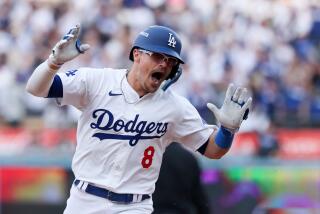COMMENTARY : Ripken Puts on a Show in Gehrig’s Ballpark
NEW YORK — The shadows were beginning to grow by the grandstand when Cal Ripken stepped to the plate in the eighth inning Wednesday at Yankee Stadium.
The Baltimore Orioles were already ahead by four runs, well on their way to a victory they desperately needed. And suddenly there was this thought: This was probably Ripken’s last at-bat at Yankee Stadium--Lou Gehrig’s ballpark, where he played all those years and wept at the end--before Ripken breaks Gehrig’s consecutive games streak early next month at Camden Yards.
Ripken said later that he didn’t think about that. “I honestly didn’t think along those lines today,” he said. “Maybe I wasn’t allowing myself to.”
But others were.
“I was thinking about it all day,” bullpen coach Elrod Hendricks said in the Oriole clubhouse after the game. “You almost couldn’t help it. This was the way Gehrig and them played ball.”
A day game at Yankee Stadium in the middle of the week. A big crowd in the big house on a warm afternoon. A bright blue sky, a breeze in your face.
“You could almost see Gehrig out there today,” Hendricks said.
Instead, you could see Ripken on day 2,104 of his streak, moving to within 27 games of passing Gehrig.
Oddly enough, he had never had that much luck on Gehrig’s field. Coming into this season, Ripken had hit fewer home runs at Yankee Stadium and Fenway Park than at any other road ballparks. Surprisingly, he had never had more than two runs batted in or one extra-base hit in a game at Yankee Stadium.
In his last game here before G-Day, on an afternoon that summoned Gehrig’s ghost, his luck changed.
Ripken drove in the Orioles’ first run of the game with a double in the second inning, then doubled again to drive in a run in the fifth. When he came to bat in the eighth, with none out and Bobby Bonilla on first, the Orioles had the game in their hands.
Bob MacDonald was pitching for the Yankees, an obscure middle reliever who had not given up a run since entering the game in the fifth. His first pitch to Ripken was a fastball, outside, ball one. The next pitch was another fastball, this one over the plate. Ripken swung hard. The ball jumped off his bat and took off on a low line drive over the shortstop’s head, heading for the plaques that honor famous Yankees in a small park beyond the left-field wall.
It was the stuff of mythology unfolding right before your eyes: Ripken’s home run ball was heading straight for Gehrig’s plaque, in Ripken’s last at-bat here before breaking Gehrig’s streak.
But this wasn’t a movie, it was just a ballgame. The ball, pulled heavily, bent sharply as it headed for the bleachers, ultimately crossing over the fence and landing in the left-field seats a good 50 feet away from the plaque.
Still, it was a home run. As Ripken circled the bases, noise began to swell in the grandstand. These are intense and knowledgeable fans, and, to their credit, they recognized the moment for what it was: a moment in which Ripken and Gehrig seemed so close in spirit that they were almost of the same family, like brothers.
As Ripken crossed the plate, many in the crowd were standing and applauding. They kept it up as he reached the dugout and disappeared from view.
“It was nice, very nice to hear,” Ripken said. “You don’t get ovations on the road too often.”
Did he know what the cheers were for? “I think so,” he said, smiling.
At times in this three-game series that ended Wednesday, it almost seemed that Ripken was trying to show Gehrig something, that he was worthy of breaking the record. Even though he didn’t get a hit in the first two games, he made several defensive plays that will make the Hall of Fame reel.
There was a relay throw from left field Tuesday night, a perfect strike from 175 feet that cut down a runner at the plate. Then there was a trademark Ripken play in which he went into the hole to snag a ball, pivoted and threw out Gerald Williams at first with a powerful throw.
Finally, Wednesday, there was the play on which he ranged toward second base to cut off a ball heading for the outfield, turned and threw sharply to first.
It turned out that he had one more at-bat in the ninth, and he flew out to right with the bases loaded. No reaction from the crowd. They’d done their thing.
The final results of his day: a four-RBI performance, his biggest ever at Yankee Stadium, in a 7-2 victory.
“He went out with a bang,” Hendricks said.
He answered reporters’ questions for 10 minutes, then took off down a corridor to do a local TV interview. He was still in full uniform, his spikes clacking on the concrete floor. A stadium attendant stopped him.
“Nice game today,” the man said in a growling New Yawk tongue.
“Thanks,” Ripken said.
The man pulled out a ball and a pen and offered them to Ripken. “Will you sign?” he said.
Ripken smiled, took the ball and pen and bent over to balance the ball against his knee. “It was a big day for me,” he said as he wrote.
More to Read
Go beyond the scoreboard
Get the latest on L.A.'s teams in the daily Sports Report newsletter.
You may occasionally receive promotional content from the Los Angeles Times.










